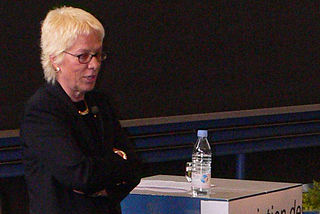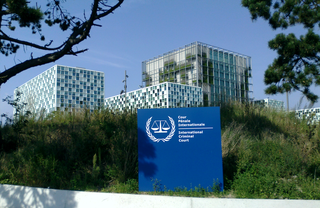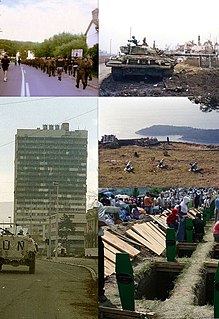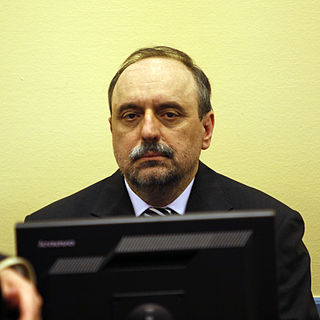
Theodor Meron is a former President of the International Criminal Tribunal for the former Yugoslavia (ICTY) and Presiding Judge of the Appeals Chambers of the International Criminal Tribunal for Rwanda and the ICTY. He was elected President of the ICTY by his fellow judges on 19 October 2011, and again on 1 October 2013.
The United Nations Detention Facility (UNDF) is a United Nations detention center located in Arusha in Northern Tanzania. The other one is the United Nations Detention Unit in The Hague, Netherlands. The facility is maintained by the Mechanism for International Criminal Tribunals (MICT) UN organization.
Karim A. A. Khan QC is a British lawyer and a specialist in international criminal law and international human rights law. Following his appointment by United Nations Secretary General António Guterres, he is currently Special Adviser and Head of the Investigative Team for the United Nations Investigative Team for the Promotion of Accountability for Crimes Committed by Da'esh/ISIL in Iraq (UNITAD), established pursuant to Security Council resolution 2379 (2017) to support domestic efforts to hold ISIL (Da'esh) accountable for acts that may amount to war crimes, genocide, and crimes against humanity in Iraq.

Hassan Bubacar Jallow is a Gambian judge who has served as Chief Justice of the Gambia since February 2017. He was the Prosecutor of the International Criminal Tribunal for Rwanda (ICTR) from 2003 to 2015, and Prosecutor of the Mechanism for International Criminal Tribunals (MICT) from 2012 to 2016. He served as Minister of Justice and Attorney General from 1984 to 1994 under President Dawda Jawara.

United Nations Security Council resolution 955, adopted on 8 November 1994, after recalling all resolutions on Rwanda, the Council noted that serious violations of international humanitarian law had taken place in the country and, acting under Chapter VII of the United Nations Charter, established the International Criminal Tribunal for Rwanda (ICTR).

United Nations Security Council resolution 1047, adopted unanimously on 29 February 1996, after recalling resolutions 808 (1993), 827 (1993), 936 (1994) and 955 (1994), the Council appointed Louise Arbour as Prosecutor at the International Criminal Tribunal for Rwanda (ICTR) and the International Criminal Tribunal for the former Yugoslavia (ICTY).

United Nations Security Council resolution 1259, adopted unanimously on 11 August 1999, after recalling resolutions 808 (1993), 827 (1993), 936 (1994), 955 (1994) and 1047 (1996), the Council appointed Carla Del Ponte as Prosecutor at the International Criminal Tribunal for Rwanda (ICTR) and the International Criminal Tribunal for the former Yugoslavia (ICTY).

United Nations Security Council resolution 1329, adopted unanimously on 30 November 2000, after recalling resolutions 827 (1993) and 955 (1994), the Council enlarged the appeals chambers at both the International Criminal Tribunal for Rwanda (ICTR) and the International Criminal Tribunal for the former Yugoslavia (ICTY), proposed the election of two additional judges at the ICTR and established a pool of ad litem judges at the ICTY.

United Nations Security Council resolution 1411, adopted unanimously on 17 May 2002, after recalling resolutions 827 (1993), 955 (1994), 1165 (1998), 1166 (1998) and 1329 (2000), the Council amended the statutes of the International Criminal Tribunals for Rwanda (ICTR) and the former Yugoslavia (ICTY) to address the issue of judges holding dual nationalities.
United Nations Security Council resolution 1431, adopted unanimously on 14 August 2002, after recalling resolutions 827 (1993), 955 (1994), 1165 (1998), 1166 (1998), 1329 (2000) and 1411 (2002), the Council established a pool of temporary judges at the International Criminal Tribunal for Rwanda (ICTR) in order for it to complete its work as soon as possible.

United Nations Security Council resolution 1503, adopted unanimously on 28 August 2003, after recalling resolutions 827 (1993), 955 (1994), 978 (1995), 1165 (1998), 1166 (1998), 1329 (2000), 1411 (2002), 1431 (2002) and 1481 (2003), the Council decided to split the prosecutorial duties of the International Criminal Tribunal for the former Yugoslavia (ICTY) and the International Criminal Tribunal for Rwanda (ICTR) which had previously been under the responsibility of one official, Carla Del Ponte, since 1999.

United Nations Security Council Resolution 1955, adopted unanimously on December 14, 2010, after recalling resolutions 955 (1995), 1165 (1998), 1329 (2000), 1411 (2002), 1431 (2002), 1717 (2006), 1824 (2008), 1855 (2008), 1878 (2008), 1901 (2009) and 1931 (2010) on Rwanda, the Council permitted three judges to complete their cases at the International Criminal Tribunal for Rwanda (ICTR) beyond their terms of office, and increased the number of temporary judges at the tribunal.

United Nations Security Council Resolution 1966, adopted on December 22, 2010, after recalling resolutions 827 (1993) and 955 (1994), the Council established a residual mechanism to conclude the remaining tasks of the International Criminal Tribunals for Rwanda (ICTR) and former Yugoslavia (ICTY). It was the final Security Council resolution adopted in 2010.

United Nations Security Council Resolution 1684, adopted unanimously on June 13, 2006, after recalling resolutions 955 (1994), 1165 (1998), 1329 (2000), 1411 (2002), 1431 (2002), 1449 (2002), 1503 (2003) and 1534 (2004) concerning the International Criminal Tribunal for Rwanda (ICTR), the Council extended the terms of 11 judges beyond their expiry dates in order for them to complete the trials in which they were sitting.
United Nations Security Council Resolution 1995, adopted unanimously on July 6, 2011, after recalling resolutions 955 (1995), 1503 (2003) and 1534 (2003) on the International Criminal Tribunal for Rwanda (ICTR), the Council permitted temporary judges at the tribunal to vote or stand as candidates in elections to the presidency of the ICTR.
Peter Robinson is an American lawyer who has defended political and military leaders at the United Nations International Criminal Tribunals. His clients include Bosnian Serb President Radovan Karadžić, Rwandan National Assembly President Joseph Nzirorera, Yugoslav Army Chief of Staff Dragoljub Ojdanic, and the lawyer for Liberian President Charles Taylor.
William H. Sekule is a Tanzanian judge who served on the International Criminal Tribunal for Rwanda (ICTR) in Arusha, Tanzania between May 1995 and March 2013. He was the presiding judge of the ICTR Trial Chamber II from June 1995 to June 1999 and from June 2001 to March 2013. He is a graduate of the University of Dar es Salaam of the University of East Africa, where he has also served on the Board of the Faculty of Law.





















